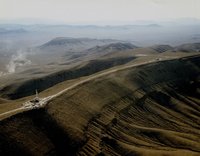Nuclear Waste Policy Act of 1982, United States
 Yucca Mountain, Neveda, site of the future long term repository for high level nuclear waste in the U.S. (Source: U.S. Department of Energy)
Yucca Mountain, Neveda, site of the future long term repository for high level nuclear waste in the U.S. (Source: U.S. Department of Energy) United States Congress passed the Nuclear Waste Policy Act of 1982 primarily to encourage development of repositories for the disposal of high-level radioactive waste and spent nuclear fuel. The Act established the Office of Civilian Radioactive Waste Management within the U.S. Department of Energy (DOE) to handle such repositories. The Office had the responsibility of building, operating, and monitoring these geologically-mined repositories. It was also charged with developing a transportation system connecting the nuclear power plants and repositories to guarantee the safe transport of nuclear waste.
Under the Act, approval by the Nuclear Regulatory Commission (NRC) is needed before a repository can go into use. To pay for such activities, the Act established the Nuclear Waste Fund that required energy consumers to pay a small fee on the power generated at nuclear power plants. A 1987 amendment created the Nuclear Waste Technical Review Board, composed of ten presidentially-appointed scientists, to act as an independent source of expert advice on the scientific and technical aspects of the DOE’s handling of the disposal process. After extensive studies of multiple sites, controversy, and litigation, the DOE stated its intentions to build a long-term nuclear waste repository in Yucca Mountain, Nevada.
Further Reading
- U.S. Department of Energy, Office of Civilian Radioactive Waste Management. Amended Nuclear Waste Policy Act.
- U.S. Senate Committee on Environment and Public Works. Nuclear Waste Policy Act of 1982: Full Text. (PDF)